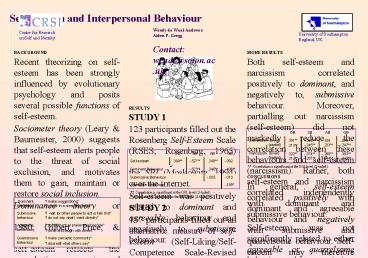RESULTS - PowerPoint PPT Presentation
1 / 1
Title:
RESULTS
Description:
123 participants filled out the Rosenberg Self-Esteem Scale (RSES; Rosenberg, ... Allan, 1995) suggests that self-esteem reflects 'the approbation, respect and ... – PowerPoint PPT presentation
Number of Views:33
Avg rating:3.0/5.0
Title: RESULTS
1
Self-Esteem and Interpersonal Behaviour
Wendy de Waal-Andrews Aiden P. Gregg Contact
wendy_at_soton.ac.uk
Centre for Research on Self and Identity
University of Southampton England, UK
MORE RESULTS Both self-esteem and narcissism
correlated positively to dominant, and negatively
to, submissive behaviour. Moreover, partialling
out narcissism (self-esteem) did not markedly
reduce the correlation between these behaviours
and self-esteem (narcissism). Rather, both
self-esteem and narcissism correlated
independently with dominant and submissive
behaviour. Self-esteem was not significantly
related to either agreeable or quarrelsome
behaviour, but narcissism was negatively related
to agreeable and positively related to
quarrelsome behaviour. Moreover, partialling out
narcissism (self-esteem) significantly increased
the correlation between these behaviours and
self-esteem (narcissism).
BACKGROUND Recent theorizing on self-esteem has
been strongly influenced by evolutionary
psychology and posits several possible functions
of self-esteem. Sociometer theory (Leary
Baumeister, 2000) suggests that self-esteem
alerts people to the threat of social exclusion,
and motivates them to gain, maintain or restore
social inclusion. Dominance theory or prestige
theory (Barkow, 1980 Gilbert, Price, Allan,
1995) suggests that self-esteem reflects the
approbation, respect and even deference of those
important to one (Barkow, 1980, p. 322) and
motivates people to gain, maintain or restore
their standing relative to others. Some
empirical finding suggest that self-esteem is
related to (self-perceived) dominance and
acceptance (Leary, Cottrell, Phillips, 2001).
However, no research to date addresses the
behavioural process through which self-esteem
might regulate these different interpersonal
outcomes to perform its evolutionary function.
CURRENT STUDIES The two studies reported here
assessed the relationship between self-esteem and
interpersonal behaviour, measured by an adjusted
version of the Social Behaviour Inventory (SBI
Moskowitz, 1994). This measure asks people to
rate how characteristic several dominant,
submissive, agreeable, and quarrelsome behaviours
are for them when interacting with peers in a
group setting.
RESULTS STUDY 1 123 participants filled out the
Rosenberg Self-Esteem Scale (RSES Rosenberg,
1965) and the adjusted version of the SBI
(Moskowitz, 1994) over the Internet.
Self-esteem was positively related to dominant
and agreeable behaviour and negatively to
submissive behaviour.
Correlation is significant at the 0.01 level
(2-tailed).
CONCLUSIONS In general, self-esteem correlated
positively with dominant and agreeable behaviour
and negatively with submissive and quarrelsome
behaviour. Self-esteem may therefore regulate
more than social inclusion, but rather relate
more generally to peoples social status, rank,
or prestige (Barkow, 1980 Gilbert, Price,
Allan, 1995). Moreover, different types of
interpersonal behaviour may mediate the relation
between self-esteem and interpersonal
outcomes. These studies form part of a larger
research project aimed at learning more about the
role of self-esteem in shaping interpersonal
outcomes. Future work will assess interpersonal
outcomes as well as behaviour and use more
objective measures of interpersonal behaviour.
Correlation is significant at the 0.01 level
(2-tailed). Correlation is significant at the
0.05 level (2-tailed).
STUDY 2 157 participants filled out an
alternative measure of self-esteem
(Self-Liking/Self-Competence Scale-Revised
Version (SLCS-R) Tafarodi Swann, 2001), a
short measure of narcissism (Ames, Rose,
Anderson, 2006) and the adjusted SBI (Moskowitz,
1994), over the Internet. Results for self-esteem
and narcissism were contrasted to rule out
narcissism as the driver of the relation between
self-esteem and dominance (Brown Zeigler-Hill,
2004).































